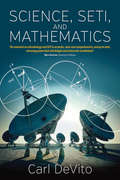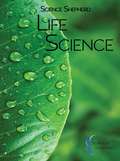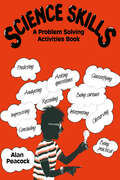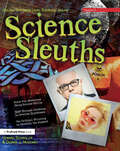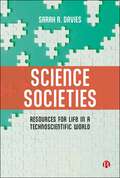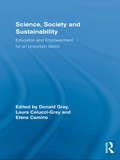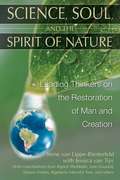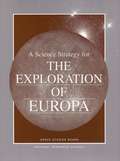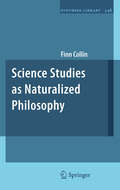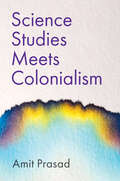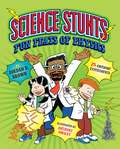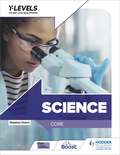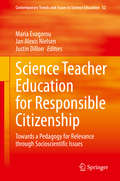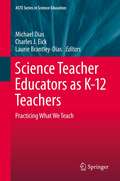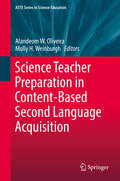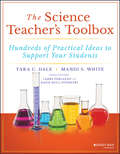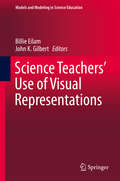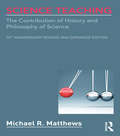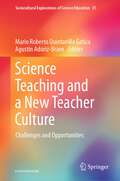- Table View
- List View
Science, Seti, and Mathematics
by Carl L. DeVitoMathematics is as much a part of our humanity as music and art. And it is our mathematics that might be understandable, even familiar, to a distant race and might provide the basis for mutual communication. This book discusses, in a conversational way, the role of mathematics in the search for extraterrestrial intelligence. The author explores the science behind that search, its history, and the many questions associated with it, including those regarding the nature of language and the philosophical/psychological motivation behind this search.
Science Shepherd Biology
by Scott Hardin MdThe first edition has been pretty well received by reviewers and, more importantly, parents and students. It is gratifying to receive thanks and compliments, which really serve as great blessings to me. I am also very grateful to the many parents and students who have asked questions and made suggestions regarding what they might like to see either in the next edition or in an entirely new subject. Over the past couple of years, I had become increasingly convicted by the Holy Spirit that my first edition treatment of creation and evolution was not what it should be, that God wanted more. In the first edition, the presentation was much softer as related to the correlation of biblical principles to scientific interpretation. One affects the other and I really felt that God was telling me that I needed to incorporate more theologically based and exegetically sounder creation and evolution chapters into the biology curriculum.
Science Shepherd Life Science Textbook (2012 Edition)
by Scott HardinScience Shepherd's Life Science curriculum was developed for homeschoolers who wish to teach science through the middle school levels--without any fear! Designed for independent students, the step-by-step fashion makes it easy for students to progress without extensive parental knowledge. Full-color photos and graphics are included with descriptive labels; study questions are given at the end of each chapter. This textbook covers the characteristics of life, cells, DNA, heredity, and the classification structure of each kingdom. Evolution and creation are also covered from a creationist perspective.
Science Skills: A Problem Solving Activities Book
by Alan PeacockThis is a practical book for pupils, designed to teach the basic skills of scientific investigation and problem solving. With an emphasis on skills not facts, it is practical in approach, describing over 100 activities. No specialised apparatus is required and the investigations it covers are flexible enought to relate to any science course.
Science Sleuths: Solving Mysteries Using Scientific Inquiry (Grades 6-9)
by Howard Schindler Dennis J. MucenskiBuilding on the growing public interest in forensics, the three cases featured in Science Sleuths: Solving Mysteries Using Scientific Inquiry merge science and literacy, requiring students to be critical and active readers as they conduct their investigation. Beginning with an evaluation of the crime scene photos, the student investigators will analyze lab reports, phone messages, and interviews to extract key information. Students will sort through the evidence to formulate their initial hypothesis (being alert to red herrings) as they work to identify the person responsible for each crime. Students are given additional sets of information as they make their way through the case, requiring them to reformulate their initial hypothesis until they arrive at a final conclusion. The students' final write-up consists of a chart explaining the means, motive, and opportunity for each of the suspects, in addition to a thorough analysis of the evidence and a recreation of the case. Eventually, students are able to determine which suspect should be charged with the crime!Students will:solve fun mysteries using science skills,sort through evidence to develope hypotheses, anduse critical thinking to identify the suspect.Grades 6-9
Science, Social Science class 6 - Tamil Nadu Board
by Tamil GovernmentThe Science textbook for standard six has been prepared following the guidelines given in the National Curriculum Framework 2005. The book is designed to maintain the paradigm shift from the primary General Science to branches as Physics, Chemistry, Botany and Zoology.
Science, Social Science Volume 3 Term 2 class 6 - Tamil Nadu Board
by Tamil GovernmentThe Science textbook for standard six has been prepared following the guidelines given in the National Curriculum Framework 2005. The book is designed to maintain the paradigm shift from the primary General Science to branches as Physics, Chemistry, Botany and Zoology.
Science, Social Science Volume 3 Term 3 class 6 - Tamil Nadu Board
by State Council of Educational Research TrainingThe Social Science textbook for standard six of term 3 and volume 3. The book is designed to maintain the paradigm shift from the primary General Science to branches as Physics, Chemistry, Botany and Zoology.
Science Societies: Resources for Life in a Technoscientific World
by Sarah R. DaviesWhat role do science and technology play in society? What is the nature of expert knowledge? What is science’s relation to democracy? This introduction to science, technology, and society answers these questions, and more, by exploring contemporary research on topics such as expertise, activism, science policy, and innovation. It offers a comprehensive resource for considering the place that science and technology have in contemporary societies, and the roles that they can and should play. Accessible to a non-specialist audience, it draws on a rich range of cases and examples, from nuclear activism in India to content moderation in Kenya. Framing science as always social, and society as always shaped by science and technology, it asks: what worlds do we want science and technology to bring into being?
Science, Society and Sustainability: Education and Empowerment for an Uncertain World (Routledge Research in Education)
by Donald Gray Laura Colucci-Gray Elena CaminoRecent work in science and technological studies has provided a clearer understanding of the way in which science functions in society and the interconnectedness among different strands of science, policy, economy and environment. It is well acknowledged that a different way of thinking is required in order to address problems facing the global community, particularly in relation to issues of risk and uncertainty, which affect humanity as a whole. However, approaches to education in science tend to perpetuate an outmoded way of thinking that is incommensurable with preparing individuals for participation and decision-making in an uncertain, complex world. Drawing on experiences of interdisciplinary dialogue and practice in a higher education context, this book illustrates how reformulating the agenda in science and technology can have a revolutionary impact on learning and teaching in the classroom at all levels. This exceptional study will interest scholars in Education, Science, Technology, and Society, and those looking to further deliberative democracy and civic participation in their students.
Science, Soul, and the Spirit of Nature: Leading Thinkers on the Restoration of Man and Creation
by Irene van Lippe-Biesterfeld Jane Goodall Jessica Van Tijn Masaru Emoto Rigoberta Menchú Tum Rupert SheldrakeAn exploration of the relationship between humans and nature through conversations with 12 leading scientific and social visionaries • Explores the importance of the unification of humankind and nature as it relates to creation, destruction, diversity, and the spiritual health of the world • Contains interviews with Rupert Sheldrake, Jane Goodall, and Nobel Peace Prize-winner Rigoberta Menchú Tum, among others Society’s attitude toward nature has changed considerably over the years. Terms pertaining to the anthropocentric paradigm of "mankind in charge," such as supervisor or owner, have been replaced by caretaker or trustee. This approach, although more appropriate, still indicates a complete separation of humankind from nature. Yet increasing numbers of people have begun to feel that they are intrinsically part of nature. This concept of unity with the natural world--that we are nature--is gaining momentum among many innovative social reformers from many diverse fields. In Science, Soul, and the Spirit of Nature, Irene van Lippe-Biesterfeld interviews 12 respected visionary thinkers, representing all continents, about their deep connection with the earth and their views on the relationship between humanity and nature. Presented as a series of thought-provoking conversations, this book delves deeply into the many conceptions we hold about nature, showing that while many strides have been made in the area of its preservation, we must now take the next step. Each contributor adds insights into the urgent change in consciousness that we must adopt in order to heal and restore our holistic relationship with the earth that was emblematic of the first peoples--reminding us that a separation from and destruction of nature is a spiritual destruction of ourselves.
Science Squad: Porpoises In Peril
by Gwendolyn HooksCan Jada, Kate, Cam, and Reggie use their scientific and observation skills to find out what..or who... is making the porpoises unwell?
A Science Strategy for the Exploration of Europa
by National Research CouncilA Science Strategy for the Exploration of Europa
Science Studies as Naturalized Philosophy
by Finn CollinThis book approaches its subject matter in a way that combines a strong analytical and critical perspective with a historical and sociological framework for the understanding of the emergence of Science Studies. This is a novelty, since extant literature on this topic tends either to narrate the history of the field, with little criticism, or to criticize Science Studies from a philosophical platform but with little interest in its historical and social context. The book provides a critical review of the most prominent figures in Science Studies (also known as Science and Technology Studies) and traces the historical roots of the discipline back to developments emerging after World War II. It also presents it as an heir to a long trend in Western thought towards the naturalization of philosophy, where a priori modes of thought are replaced by empirical ones. Finally, it points to ways for Science Studies to proceed in the future.
Science Studies Meets Colonialism
by Amit PrasadThe field of science and technology studies has long critiqued the idea that there is such a thing as a universal and singular "Science" that exists independently of human society, interpretation, and action. However, the multiple significant ways in which colonial legacies impact and shape this project have often remained out of sight at the edges of the discipline. In this important book, Amit Prasad seeks to rectify this erasure, demonstrating that problematic idealized imaginaries of science, scientists, and the scientific realm can be traced back to the birth of "modern science" during European colonialism. Such visions of science and technology have undergirded the imagination of the West (and thus of its others), constructing hierarchies of technological innovation and scientific value, but also unexpectedly leaving society vulnerable to contemporary threats of misinformation and conspiracy theories, as has been strikingly evident during the COVID-19 pandemic. Far from being an indictment of STS, this rigorous book seeks to highlight such concerns to make STS engage more carefully with issues of colonialism and thus to enable readers to understand the rapidly changing global topography of science and technology today and into the future.
Science Study Notebook (California Science Grade #5)
by Scott ForesmanThe Science Study Notebook is your companion as you read and study your science textbook. It will help you take notes as you read and learn vocabulary words. It also will help you record results as you conduct science activities.
Science Stunts: Fun Feats of Physics
by Jordan D. BrownDO try this at home! Science Stunts will start a chain reaction of fun and experimentation outside the lab. Readers will be amazed and delighted as they try magic tricks that are based in important physics concepts such as gravity, inertia, magnetism, sound vibrations, and more. Narrated by a humorous science showman, Dr. Dazzleberry (known to his fans as "Dr. Dazz"), readers go on a journey through many amazing scientific discoveries. Amusing, edifying commentary from cartoon versions of Newton, Galileo, and Einstein inspire student scientist to experiment with glee. An appendix and short bios of the physicists featured provide fascinating facts about the scientists' lives and achievements."Magical science that's amazing, astounding, and sure to appeal to middle-grade and middle school readers."-Kirkus Reviews
Science T Level: Core
by Stephen HoareStart your journey towards a career in science. Covering all the Core content you need to know with clear definitions alongside practice questions, this T level textbook gives you the skills and confidence to succeed in your written assessment and industry placement. Created in partnership with NCFE and written by highly respected author Stephen Hoare. - Get started with short, clear summaries and learning outcomes at the beginning of each chapter- Develop the scientific, mathematical, technical and communication skills you need- Track your progress and check understanding using the 'Test yourself' activities - Understand and remember key scientific terms using the highlighted definitions- Prepare for your placement with tips on best practice in the workplace, alongside case studies and activities that reflect real-life situations and build problem-solving skills- Approach assessment with confidence using the knowledge-based questions and scenario-based activities for practice, alongside model answers for the extended response questionsThis textbook covers the Core content for Science T Level. The Occupational Specialisms for this course are: Laboratory Sciences, Food Sciences and Metrology Sciences.
Science Teacher Education for Responsible Citizenship: Towards a Pedagogy for Relevance through Socioscientific Issues (Contemporary Trends and Issues in Science Education #52)
by Justin Dillon Maria Evagorou Jan Alexis NielsenThis edited book aims to provide a global perspective on socioscientific issues (SSI), responsible citizenship and the relevance of science, with an emphasis on science teacher education. The volume, with more than twenty-five contributors from Africa, North and South America, Asia, Australasia and Europe, focuses on examples from in- and pre-service teacher training. The contributors expand on issues related to teachers’ beliefs about teaching SSI, teachers’ challenges when designing and implementing SSI-related activities, the role of professional development, both in pre- and in-service teacher training, in promoting SSI, the role of the nature of science when teaching SSI, promoting scientific practices through SSI in pre-service teaching, and the role of indigenous knowledge in SSI teaching. Finally, the book discusses new perspectives for addressing SSI in teacher education through the lens of relevance and responsible citizenship.
Science Teacher Educators as K-12 Teachers: Practicing what we teach
by Laurie Brantley-Dias Michael Dias Charles J. EickScience teacher educators prepare and provide professional development for teachers at all grade levels. They seek to improve conditions in classroom teaching and learning, professional development, and teacher recruitment and retention. Science Teacher Educators as K-12 Teachers: Practicing What We Teach tells the story of sixteen teacher educators who stepped away from their traditional role and entered the classroom to teach children and adolescents in public schools and informal settings. It details the practical and theoretical insights that these members of the Association of Science Teacher Educators (ASTE) earned from experiences ranging from periodic guest teaching to full-time engagement in the teaching role. Science Teacher Educators as K-12 Teachers shows science teacher educators as professionals engaged in reflective analysis of their beliefs about and experiences with teaching children or adolescents science. With their ideas about instruction and learning challenged, these educators became more aware of the circumstances today's teachers face. Their honest accounts reveal that through teaching children and adolescents, teacher educators can also renew themselves and expand their identities as well as their understanding of themselves in the profession and in relation to others. Science Teacher Educators as K-12 Teachers will appeal to all those with an interest in science education, from teacher educators to science teachers, as well as teacher educators in other disciplines. Its narratives and insights may even inspire more teacher educators to envision new opportunities to serve teachers, K-12 learners and the local community through a variety of teaching arrangements in public schools and informal education settings.
Science Teacher Preparation in Content-Based Second Language Acquisition
by Alandeom W. Oliveira Molly H. WeinburghThe primary purpose of this book is to provide science teacher educators with exemplars of professional development programs designed to prepare school teachers to effectively help language learners in science classrooms simultaneously gain language proficiency and conceptual understanding. To this end, this book examines seventeen science teacher preparation programs that span a wide variety of grade levels (elementary, middle, and secondary), countries (Italy, Luxemburg, Spain, UK, and US), and linguistic contexts (English as a Second Language, English as a Foreign Language, trilingual classrooms, and teaching deaf children science through sign language). The book is divided into three main parts. Each part consists of chapters that illustrate a common, cross-cutting theme in science teacher preparation in content-based second language acquisition, namely pre-service teacher preparation, in-service teacher preparation, and international perspectives. Each part provides many insights on the similarities and differences in the professional development approaches used to prepare science teaching with varied amounts of instructional experience help students in different parts of the world overcome linguistic barriers while simultaneously learning concepts central to science. Bringing together researchers from various academic backgrounds (science education, TESOL, and Applied Linguistics), attention is given to varied facets of the intersection of science and language learning in the specific context of school teacher preparation.
The Science Teacher's Toolbox: Hundreds of Practical Ideas to Support Your Students (The Teacher's Toolbox Series)
by Tara C. Dale Mandi S. WhiteA winning educational formula of engaging lessons and powerful strategies for science teachers in numerous classroom settings The Teacher’s Toolbox series is an innovative, research-based resource providing teachers with instructional strategies for students of all levels and abilities. Each book in the collection focuses on a specific content area. Clear, concise guidance enables teachers to quickly integrate low-prep, high-value lessons and strategies in their middle school and high school classrooms. Every strategy follows a practical, how-to format established by the series editors. The Science Teacher's Toolbox is a classroom-tested resource offering hundreds of accessible, student-friendly lessons and strategies that can be implemented in a variety of educational settings. Concise chapters fully explain the research basis, necessary technology, Next Generation Science Standards correlation, and implementation of each lesson and strategy. Favoring a hands-on approach, this bookprovides step-by-step instructions that help teachers to apply their new skills and knowledge in their classrooms immediately. Lessons cover topics such as setting up labs, conducting experiments, using graphs, analyzing data, writing lab reports, incorporating technology, assessing student learning, teaching all-ability students, and much more. This book enables science teachers to: Understand how each strategy works in the classroom and avoid common mistakes Promote culturally responsive classrooms Activate and enhance prior knowledge Bring fresh and engaging activities into the classroom and the science lab Written by respected authors and educators, The Science Teacher's Toolbox: Hundreds of Practical Ideas to Support Your Students is an invaluable aid for upper elementary, middle school, and high school science educators as well those in teacher education programs and staff development professionals.
Science Teachers' Use of Visual Representations
by Billie Eilam John K. GilbertThis book examines the diverse use of visual representations by teachers in the science classroom. It contains unique pedagogies related to the use of visualization, presents original curriculum materials as well as explores future possibilities. The book begins by looking at the significance of visual representations in the teaching of science. It then goes on to detail two recent innovations in the field: simulations and slowmation, a process of explicit visualization. It also evaluates the way teachers have used different diagrams to illustrate concepts in biology and chemistry. Next, the book explores the use of visual representations in culturally diverse classrooms, including the implication of culture for teachers' use of representations, the crucial importance of language in the design and use of visualizations and visualizations in popular books about chemistry. It also shows the place of visualizations in the growing use of informal, self-directed science education. Overall, the book concludes that if the potential of visualizations in science education is to be realized in the future, the subject must be included in both pre-service and in-service teacher education. It explores ways to develop science teachers' representational competence and details the impact that this will have on their teaching. The worldwide trend towards providing science education for all, coupled with the increased availability of color printing, access to personal computers and projection facilities, has lead to a more extensive and diverse use of visual representations in the classroom. This book offers unique insights into the relationship between visual representations and science education, making it an ideal resource for educators as well as researchers in science education, visualization and pedagogy.
Science Teaching: The Contribution of History and Philosophy of Science, 20th Anniversary Revised and Expanded Edition
by Michael R. MatthewsScience Teaching explains how history and philosophy of science contributes to the resolution of persistent theoretical, curricular, and pedagogical issues in science education. It shows why it is essential for science teachers to know and appreciate the history and philosophy of the subject they teach and how this knowledge can enrich science instruction and enthuse students in the subject. Through its historical perspective, the book reveals to students, teachers, and researchers the foundations of scientific knowledge and its connection to philosophy, metaphysics, mathematics, and broader social influences including the European Enlightenment, and develops detailed arguments about constructivism, worldviews and science, multicultural science education, inquiry teaching, values, and teacher education. Fully updated and expanded, the 20th Anniversary Edition of this classic text, featuring four new chapters—The Enlightenment Tradition; Joseph Priestley and Photosynthesis; Science, Worldviews and Education; and Nature of Science Research—and 1,300 references, provides a solid foundation for teaching and learning in the field.
Science Teaching and a New Teacher Culture: Challenges and Opportunities (Sociocultural Explorations of Science Education #31)
by Mario Roberto Quintanilla Gatica Agustín Adúriz-BravoThis edited volume discusses various epistemological positions about science teaching and the complex processes of understanding and learning in the classroom. Including discussions around Natural Sciences teacher training models, as well as the development of logics of reflection on practice based on critical and dialogic interpretative visions guiding higher level competency learning. It brings together contributions from researchers promoting a coherent and robust methodological analysis, theoretically based on the systematization of evidence in different contexts within Europe and Latin America.While supporting innovation in teacher training and science teaching, it offers specific contributions and suggestions for classroom work in the subjects of Physics, Chemistry and Biology. It includes didactic guidelines for experimental practices, for the evaluation of scientific learning, as well as for the use of epistemology and the history of science in teaching. In addition, it’s considered an important contribution to the challenge of rebuilding science education programs as well as its correct implementation in schools and universities. This book is a translation of an original Spanish publication. The translation was done with the help of artificial intelligence (machine translation by the service DeepL.com). A subsequent human revision was done primarily in terms of content, so that the book will read stylistically differently from a conventional translation.
